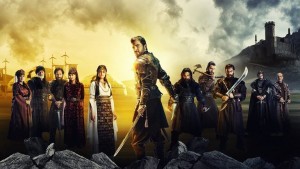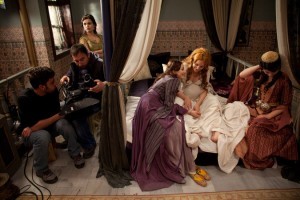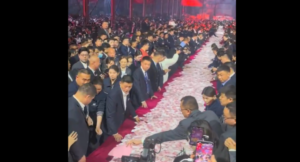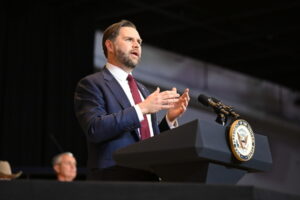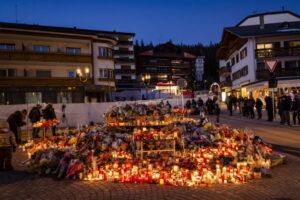With President Recep Tayyip Erdogan of Turkey visiting President Trump in Washington this week, it might be useful to briefly turn away from the conventional explanatory sources and consider a wildly popular television series that is capturing the zeitgeist in Turkey.
Over three bombastic seasons so far, “Dirilis: Ertugrul” (Resurrection: Ertugrul) has described medieval campaigns waged by Turks against Christian enemies. Focusing on the life of Ertugrul Bey, father of Osman Bey, the 13th-century founder of the Ottoman Empire, the series leads television ratings in Turkey every week. Its loaded tagline: “A nation’s awakening.”
This chimes with the spirit of the age after Mr. Erdogan framed the constitutional referendum in April as a struggle against enemies of the Turkish nation and domestic traitors.
Turkey’s national mood can often be measured by the popularity of certain television shows. A few years back, rising self-confidence was symbolized by the blockbuster success of “The Magnificent Century,” based on the life of Sultan Suleiman, who led the Ottoman Empire at the height of its power in the 16th century. Described by The New York Times in 2012 as an “Ottoman-era ‘Sex and the City,’ ” “The Magnificent Century” luxuriated in the opulence and intrigue of the Ottoman court and became an international hit.
Since the Justice and Development Party came to power in 2002, television series have become Turkey’s most glamorous export. Nearly 150 Turkish television series have been sold to over 100 countries in the Middle East, Eastern Europe, South America and South Asia. Annual exports are thought to have surpassed $300 million last year. It is common to see groups of Arab or Iranian tourists in Istanbul visiting the alluring sites they have seen on screen.
(In between takes on the set of “The Magnificent Century” in Istanbul in 2011)
But “Dirilis: Ertugrul” is more squarely aimed at a domestic audience. Broadcast on the state-run network TRT 1, its sentiments are insular and nationalistic, striking a chord in a country feeling bruised and belligerent after the military coup attempt last July. The first season featured a Turkish campaign against Crusaders in Anatolia, the second season battles against the Mongols, the third season war with the Christian Byzantines. Its relaxed approach to historical accuracy is less important than how it reflects the political mood. The show captures the Muslim nationalism expressed by President Erdogan, who during the referendum spoke of a bitter “struggle between the crescent and the cross.”
Television series have considerable importance in Turkish culture. The Turkish Statistical Institute reported in 2015 that 94.6 percent of Turks say watching television is their favorite activity. According to the Radio and Television Supreme Council, Turkish citizens on average watch 5.5 hours a day, making them the world’s biggest consumers of television shows. Serials often echo the political atmosphere. Since last year’s coup attempt, and amid military operations against the Islamic State and the Kurdistan Workers’ Party there has been a wave of television series featuring soldiers and intelligence operatives battling internal and external enemies.
Perhaps inevitably, “Dirilis: Ertugrul” has become embroiled in Turkey’s bitter culture war between religious conservatives and more secular-minded cultural elites. At an awards ceremony last November, the presenter mocked the series, and its cast and crew were not allowed to speak onstage when they accepted their award. Its scriptwriter then vowed to return his award, and President Erdogan himself waded into the controversy, praising “Dirilis: Ertugrul” as giving voice to the conservative masses. “Until the lions start writing their own stories, their hunters will always be the heroes,” he said.
The popularity of the series does not necessarily reflect the much-vaunted rise of Islamization under Mr. Erdogan. It is more about a deep-seated ambition for prestige and national assertion against enemies. Series like “Dirilis: Ertugrul” express the idea that Turkey has a unique mission as the heir of a great empire, a nation founded by men of strength, courage and wisdom. In one scene the characters talk after a battle about the kind of idealized empire they will establish, rewarding talent, intelligence and martial prowess.
Writing in the cultural journal Birikim, the Turkish scholar Semuhi Sinanoglu described how such television series work as a kind “political technology” securing legitimacy for today’s political regime. According to these series, “the names of Turkey’s enemies may have changed but their essence has remained the same since even before the founding of the Ottoman state,” Mr. Sinanoglu wrote, adding, “These enemies’ aim is to divide and destroy the country.” They invariably have “local extensions” in the form of well-connected cosmopolitans willing to commit treason for personal gain. It is a potent message in Turkey’s conspiracy-theory-fueled political culture.
The popularity of such dramas may also reflect its viewers’ wish to escape into a fantasy world more comforting than the messy reality of Turkey today. In a fiercely polarized country troubled by rising economic strife and roiled by war over the border in Syria, “Dirilis: Ertugrul” soothes viewers by tapping into a flattering foundational myth of Turkish glory.
These themes are staples of President Erdogan’s populist appeal. For years he has portrayed the huge building projects reshaping the Turkish landscape as part of a struggle against jealous foreign powers out to frustrate Turkey’s rise. A cult of personality has developed in which Mr. Erdogan is seen as the sole embodiment of the “national will.” He tells the faithful at public rallies that Turkey is fulfilling a sacred destiny under his presidency, returning to its historical role as a regional leader and global power.
(A promotional image for the Turkish television series “Dirilis: Ertugrul.”)
This makes sense to many ordinary voters who have enjoyed economic stability and improved welfare services in the 15 years of Justice and Development Party rule. With the masses behind him, Mr. Erdogan essentially says he is making Turkey great again.
“We are together with our nation, and we will walk together,” he said at a pre-referendum rally in the southeastern city of Urfa. “We say, ‘One nation, one flag, one homeland, one state.’ Who can stand in front of this unity, togetherness and brotherhood?”
Mr. Erdogan expertly channels the raw emotions of his supporters. He often slips into poetry during speeches, pulling the heartstrings of his followers and confirming their sense of shared destiny. One day after the referendum he spoke to an adoring crowd of thousands under the rain outside his presidential palace in Ankara.
“We have walked on these paths together,” he said, quoting the lyrics of a popular song he often recites. “We have been soaked by the rain together. Now every song I hear reminds me of you.”
The referendum may have been about a technical package of amendments to Turkey’s Constitution, but many voters were guided by more elemental feelings. Those who backed the constitutional changes were endorsing Mr. Erdogan’s “New Turkey” project. Part of this project is about reshaping the way Turkey interprets its past. The ubiquitous presence of “Dirilis: Ertugrul” at the top of the television ratings every week shows that millions of Turks are already on board.
Ask me anything
Explore related questions
